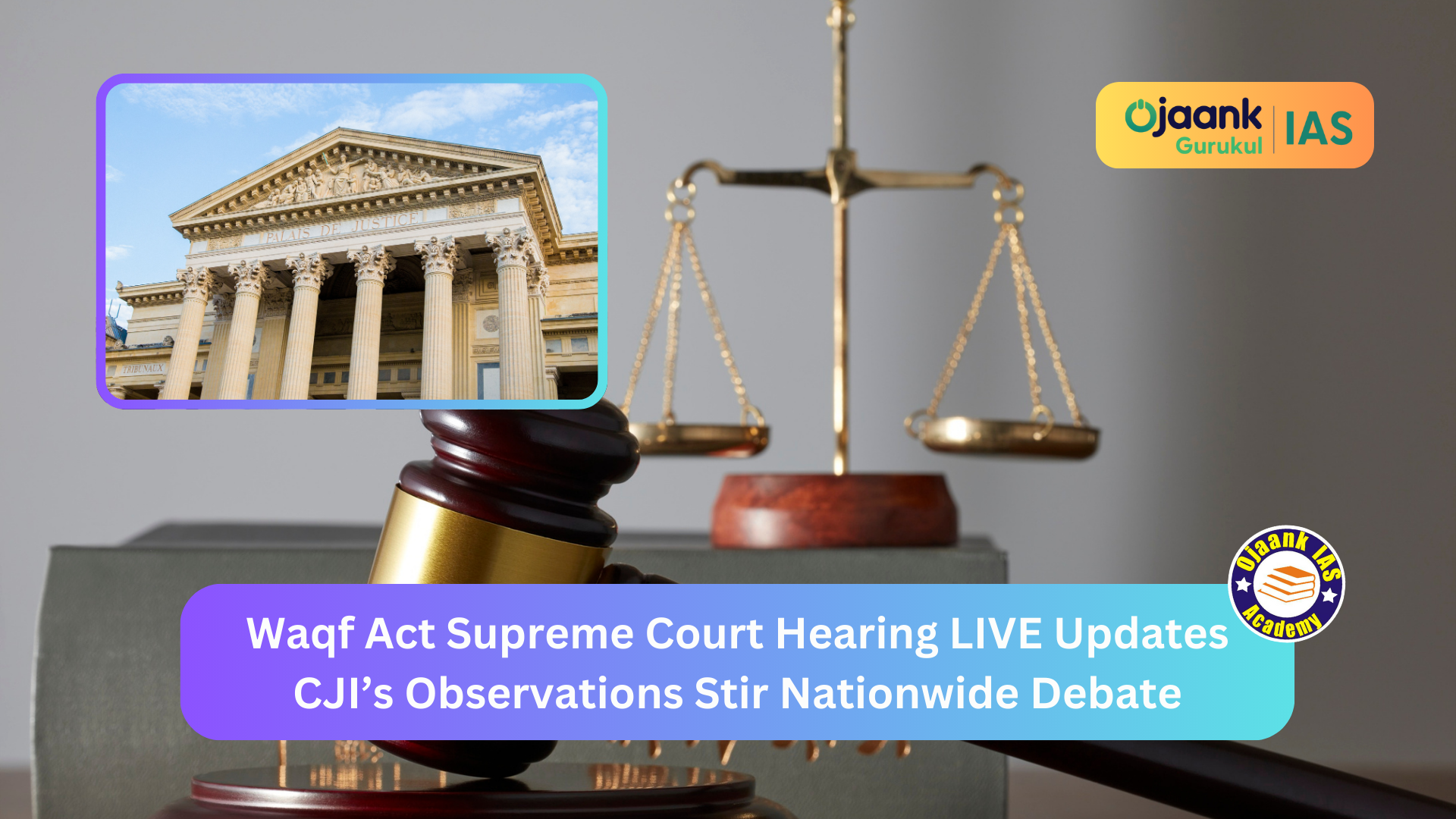Waqf Act Supreme Court Hearing LIVE Updates CJI’s Observations Stir Nationwide Debate

Introduction: Why the Waqf Act Case Matters
In a nation founded on pluralism and secular governance, any law touching on religious administration inevitably sparks debate. The Waqf (Amendment) Act, 2025, recently passed by Parliament and now under judicial scrutiny, has emerged as a legal flashpoint. With petitions challenging its constitutional validity and the Supreme Court actively engaged, the case has attracted nationwide attention.
This blog breaks down LIVE updates from the courtroom, key concerns raised by Chief Justice Sanjiv Khanna, and reactions from religious leaders, political representatives, and legal experts.
What Is the Waqf (Amendment) Act, 2025?
The Waqf Act governs Islamic endowments (waqfs)—properties or lands dedicated for religious or charitable purposes under Islamic law. The 2025 amendment introduced several controversial changes:
-
Inclusion of non-Muslims in waqf management boards
-
State authority to change disputed waqf land status
-
Derecognition of the "waqf-by-user" category
-
New transparency and accountability mechanisms
🌐 Read Next: Waqf Properties in India – Myths, Facts & Legal Insights – IndiaSpend
Supreme Court Hearings: Key Highlights
April 16, 2025:
A Bench led by CJI Sanjiv Khanna reviewed the contentious parts of the Waqf Amendment Act and proposed a three-point interim order:
-
Stay on de-notification of waqf-by-user properties
-
Designation of government officer to examine disputed properties—but freeze on converting use
-
Allow non-Muslims as ex-officio members in Waqf Boards—if majority remain Muslims
The Centre sought more time, and the court adjourned the matter to April 17, 2025.
🌐 Watch: Supreme Court on Religious Trust Autonomy – LiveLaw Report
April 17, 2025:
Day 2 of the hearing saw intense arguments and wide-ranging reactions.
CJI’s Powerful Statement:
“When we sit on the Bench, we lose our religion. We are absolutely secular.”
He was responding to the Solicitor General’s analogy implying that Hindu judges shouldn’t hear Muslim waqf matters if non-Muslims can't be on waqf boards. The Court made it clear: Secularism is the bedrock of Indian adjudication.
Court’s Challenge to Government:
“Will non-Hindus be allowed on Hindu religious trust boards too?”
This exposed a deeper constitutional contradiction in the government's logic, with the court demanding clarity on religious autonomy vs inclusivity.
Reactions Across the Spectrum
Maulana Yasoob Abbas (AISPLB):
"Hope the judiciary will do justice. We believe in the constitutional process and unity."
Chaudhary Ifraheem Husain (Muslim Cleric):
"Opposition’s petitions are misleading and wasting the Court’s time."
Mahua Moitra (TMC MP):
“Delighted SC is proposing to stay egregious parts of the Act. The government must answer tough questions.”
Pramod Tiwari (Congress Leader):
"SC is asking the same questions we raised in the JPC. This is a test of constitutional integrity."
The Core Constitutional Debate
Petitioners’ Argument:
-
Waqfs are a religious obligation under Islam
-
State interference in creation, management, or administration violates Article 25 & 26 (freedom of religion)
Government’s Defence:
-
Amendments improve transparency and curb land misuse
-
Inclusion of non-Muslims improves diversity and oversight
-
“Waqf-by-user” without formal records creates legal ambiguities
🌐 Explore: Understanding Article 25 and 26 – PRS India Brief
🌐 Must Read: Minority Rights in India: Legal Provisions and Challenges – ORF
 Communal Flashpoints
Communal Flashpoints
The CJI flagged the recent West Bengal violence linked to the Waqf law, calling it “very disturbing.” This adds urgency to the matter, as the sociopolitical fallout is escalating beyond just the courtroom.
 Expert View: Does It Threaten Religious Autonomy?
Expert View: Does It Threaten Religious Autonomy?
Legal experts warn that removing waqf-by-user protections could set a precedent affecting other religious endowments, including Hindu Mutts, Sikh Gurudwaras, and Christian charities. While the intent to regulate is understandable, the method may violate fundamental rights.
🌐 Related: The Role of Judiciary in Protecting Minority Institutions – Bar & Bench
 Political Ramifications
Political Ramifications
With a narrower margin in Rajya Sabha (128-95), the Waqf Amendment Act 2025 has already sparked intense political debate, and the SC's intervention may shape the 2025 state election narratives, particularly in minority-heavy constituencies.
 Conclusion: What’s at Stake?
Conclusion: What’s at Stake?
This is not just a legal hearing—it’s a test of India’s secular fabric.
Will the judiciary uphold religious autonomy or side with the State’s regulatory ambitions?
Will the law be remembered as a reformative step toward transparency, or a constitutional overreach into religious affairs?
All eyes are now on the Supreme Court.
🌐 Read: How India Balances Secularism and Religious Freedom – The Hindu
 Stay Updated
Stay Updated
Bookmark this blog for LIVE updates, legal analysis, and unbiased reporting on this landmark case.
Next Hearing: April 17, 2025 at 2:00 PM
 Share & Discuss
Share & Discuss
![]() What’s your take on non-Muslims in waqf boards?
What’s your take on non-Muslims in waqf boards?
![]() Share this post on X, WhatsApp, and LinkedIn.
Share this post on X, WhatsApp, and LinkedIn.
![]() Follow us for more legal explainers that break down complex cases into real impact.
Follow us for more legal explainers that break down complex cases into real impact.